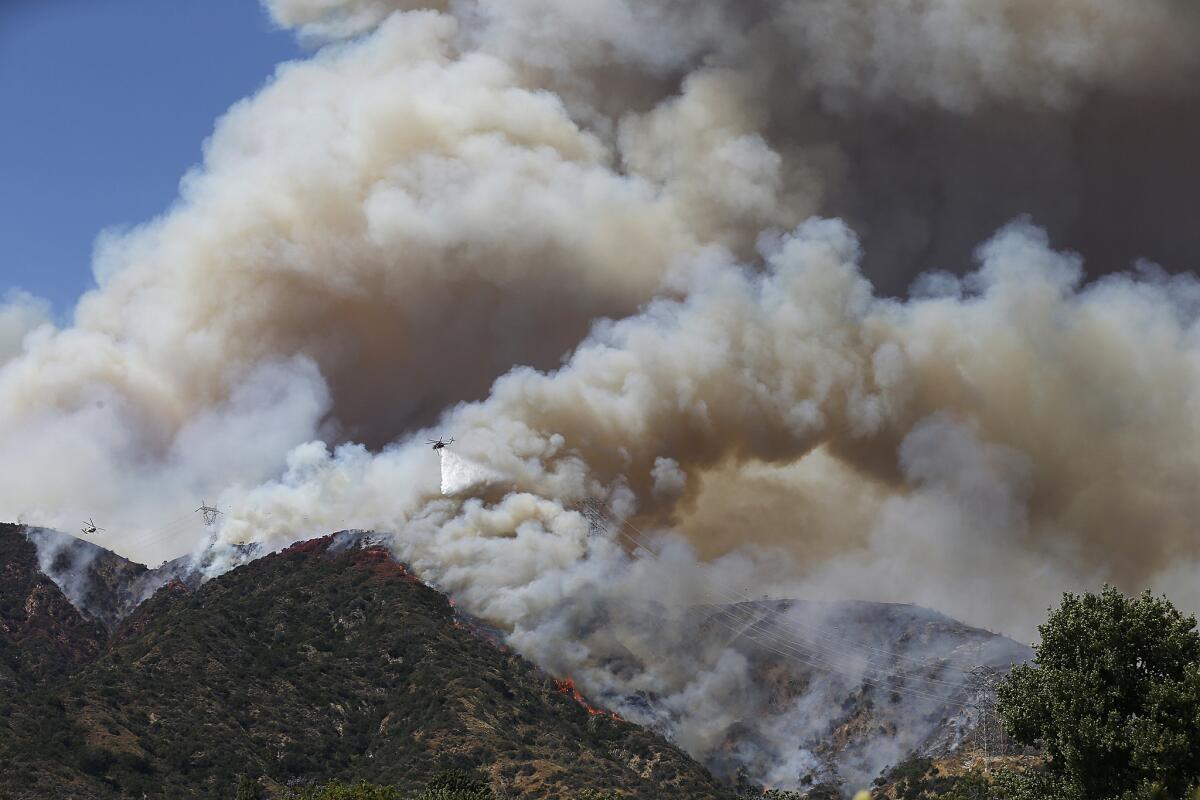2 hikers who burned to death in brush fire stood little chance, officials say
Last month, 16-year-old Jonathan Pardo and his 31-year-old cousin, Carlos Perez, went hiking in the San Gabriel Mountains above Azusa.
Hours later, two large brush fires broke out, burning thousands of acres. As firefighters battled the blazes, Pardo and Perez could not be located. Family members spent more than two weeks looking for them along the trails scarred by what came to be called the San Gabriel Complex fire.
Then, on Thursday, they found what is believed to be their charred bodies at the top of a mountain.
They were among six people who died during a series of wildfires that hit Southern California during that period. A couple died when a fire swept through their neighborhood in Lake Isabella. The bodies of another couple were found after a brush fire raced through a rural area in eastern San Diego County.
Those fires, which together burned more than 200 structures – many of them in Kern County -- were considered an omen for what is expected to be a dangerous fire season as California enters a fifth year of drought.
Jonathan’s brother, Ricardo Pardo, faulted authorities for not doing more to help locate the pair.
“Me and my family members found the bodies,” Ricardo Pardo said. “It’s sad that police officers want credit when they didn’t want to help at all.”

On Friday, as authorities used a rope system to remove the remains from a rugged area of burned forest northwest of San Gabriel Canyon Road, a Los Angeles County sheriff’s spokesman defended the actions of officials.
Sheriff’s Lt. Mike Rosson said that Azusa police were notified of the missing hikers on June 23, three days after the fire erupted, and that a missing persons report was filed that same day.
The Azusa Police Department also conducted an “emergency ping” of the 16-year-old boy’s cellphone, Rosson said. The last signal available for the phone was June 20 — the first day of the fire — and its location appeared to be in a residential area around Azusa and Irwindale. Rosson said the Police Department also notified the fire’s unified command to be on the lookout for the missing hikers.
“Under the circumstances, all proper protocol was followed,” he said. “In the world of missing persons, they did everything they could.”
It is still not confirmed that the remains are those of Pardo and Perez. It will take roughly a week for the medical examiner to analyze DNA from the bodies and compare the samples to DNA swabs taken from family members.
The remains were discovered roughly three miles from the intersection of San Gabriel Canyon Road and Old San Gabriel Canyon Road.
“Both bodies were nowhere near any bodies of water,” Rosson said. “Their location was about one hour’s hike above the road.”
The San Dimas Mountain Rescue Team confirmed that the remains were human Thursday, but because of impending darkness, homicide detectives were forced to wait until Friday morning to return to the site.
If the remains are those of Pardo and Perez, they stood little chance of escaping the fire, officials said.
“The terrain ... was uphill from the fire and about one hour away from where the ignition was,” Rosson said. “At some point in time, the fire chased them uphill.”
The San Gabriel Complex fire was made up of two adjacent blazes: the Reservoir and Fish fires.
The bodies were in the area of the Reservoir fire, a 1,146-acre blaze that was caused by a fatal vehicle crash.
ALSO:
Police fatally shoot knife-wielding man in Bell
Suspect arrested in series of attacks on homeless men in San Diego
‘We will get justice’: Family pleads for investigation into fatal police shooting of unarmed teen
UPDATES:
4:50 p.m.: This story was updated with background.
2:29 p.m.: The beginning of this article was rewritten for clarity.
1:31 p.m.: This article was updated with comments from the Los Angeles County Sheriff’s Department.
July 8, 8:59 a.m.: This article was updated with comments from Richard Pardo.
This article was originally published July 7 at 7:26 p.m.
More to Read
Sign up for Essential California
The most important California stories and recommendations in your inbox every morning.
You may occasionally receive promotional content from the Los Angeles Times.











